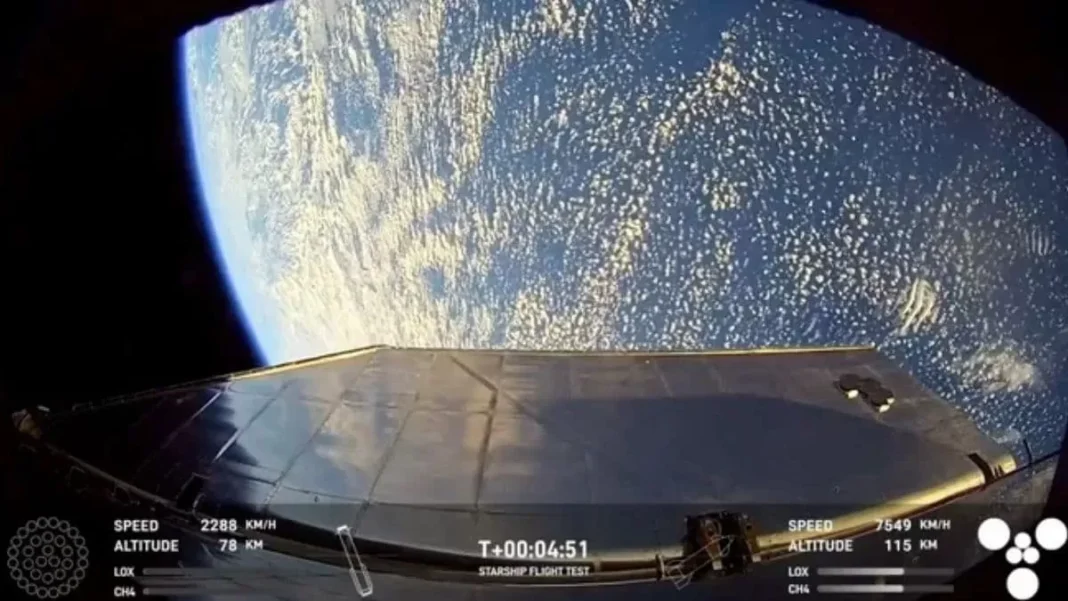NASA’s efforts to commercialize space travel took a major step forward with the latest flight test of SpaceX’s Starship vehicle. The company, founded by entrepreneur and space enthusiast Elon Musk, successfully landed its Super Heavy booster after the seventh flight test ended in an explosion over the Atlantic Ocean.
SpaceX’s journey towards reusable rocket technology has been filled with both successes and setbacks. However, with this latest milestone, the company has shown its progress towards making space travel more sustainable and affordable.
The seventh flight test of the Starship was meant to push the boundaries of space technology even further. The vehicle, designed to carry humans and cargo to destinations like the Moon and Mars, consisted of two parts – the upper stage and the Super Heavy booster. The upper stage, which is responsible for the final stages of the flight, successfully separated from the Super Heavy booster. However, moments after the separation, the upper stage exploded, marking the end of this particular test.
While the cause of the explosion is still under investigation, the successful landing of the Super Heavy booster using its “chopstick” arms is a significant achievement. It is the fifth time in a row that SpaceX has successfully landed a booster after a flight test, showcasing the company’s mastery of reusable rocket technology. This technology not only reduces the cost of space travel but also makes it more environmentally friendly.
SpaceX’s Starship vehicle has been in development for several years now, with the ultimate goal of establishing a permanent human presence on Mars. The latest successful landing of the Super Heavy booster brings the company one step closer to realizing this goal. The reusable rocket technology is crucial for such a mission as it will allow for multiple launches without the need for building new rockets every time, significantly reducing the cost.
Despite the failure of the upper stage, the seventh flight test of the Starship was not a complete loss. The crash of the upper stage provided valuable data that will help SpaceX identify and address any potential issues in its future launches. This was acknowledged by Elon Musk himself, who tweeted, “It was a successful ascent and nearly perfect landing.”
This latest flight test also highlighted the competition between SpaceX and its rival company Blue Origin, founded by Amazon’s Jeff Bezos. Blue Origin has also been working on reusable rocket technology but has not yet achieved the same level of success as SpaceX. The successful landing of the Super Heavy booster showcases SpaceX’s superiority in this field and solidifies its position as a leader in commercial space travel.
NASA’s push for commercialization of space travel has gained significant momentum in recent years. The agency has been partnering with private companies like SpaceX to reduce reliance on Russian rockets for sending astronauts to the International Space Station. The success of SpaceX’s Starship vehicle is a testament to this partnership and a step towards accomplishing NASA’s mission of sustainable space exploration.
The failure of the upper stage explosion has not dampened the spirits at SpaceX. The company continues to push the boundaries of space technology and is already moving on to the next phase of the Starship project. This next phase will involve testing the vehicle’s heat shield, designed to withstand the extreme temperatures during re-entry into the Earth’s atmosphere. The successful landing of the Super Heavy booster brings hopes of further success in this next phase.
SpaceX’s achievements in the field of reusable rockets have not only caught the attention of the space industry but also the general public. The company’s innovative and ambitious approach to space exploration has motivated many young minds to pursue careers in science, technology, engineering, and mathematics (STEM) fields. This will have a long-term impact on the advancement of space technology and the progress of humanity towards becoming a multi-planetary species.
In conclusion, despite the failure of the seventh flight test of SpaceX’s Starship vehicle, the successful landing of the Super Heavy booster using its “chopstick” arms is a significant step towards achieving the company’s goals of sustainable and affordable space travel. The cause of the explosion is under investigation, and the company is already moving forward with its next phase of testing. SpaceX’s continued success will not only benefit NASA’s efforts but also inspire future generations to aim for the stars.


